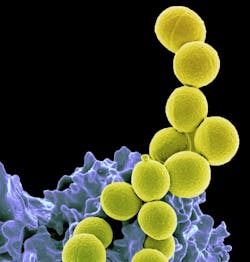A promising approach to control Staphylococcus aureus bacterial colonization in people – using a probiotic instead of antibiotics – was safe and highly effective in a Phase 2 clinical trial.
The new study, reported in The Lancet Microbe, found that the probiotic Bacillus subtilis markedly reduced S. aureus colonization in trial participants without harming the gut microbiota, which includes bacteria that can benefit people. The research was conducted by researchers at the National Institutes of Health led by Michael Otto, Ph.D., an NIH senior investigator at the National Institute of Allergy and Infectious Diseases (NIAID).
Probiotics, digestive supplements containing live microorganisms may be a way to complement or replace antibiotics. Probiotic Bacillus is especially promising because it is administered orally as spores that can survive passage through the stomach and then temporarily grow in the intestine. In prior studies, Dr. Otto’s group discovered an S. aureus sensing system needed for S. aureus to grow in the gut. They also found that fengycins, Bacillus lipopeptides that are part peptide and part lipid, prevent the S. aureus sensing system from functioning, thereby eliminating the bacteria.
In the clinical trial, conducted in Thailand, the research team tested whether this approach works in people. They enrolled 115 healthy participants, all of whom were colonized naturally with S. aureus. A group of 55 people received B. subtilis probiotic once daily for four weeks; a control group of 60 people received a placebo. After four weeks researchers evaluated the participants’ S. aureus levels in the gut and nose. They found no changes in the control group, but in the probiotic group they observed a 96.8% S. aureus reduction in the stool and a 65.4% reduction in the nose.
The researchers also found that levels of S. aureus bacteria in the gut far exceeded S. aureus in the nose, which for decades has been the focus of staph infection prevention research. This finding adds to the potential importance of S. aureus reduction in the gut.

